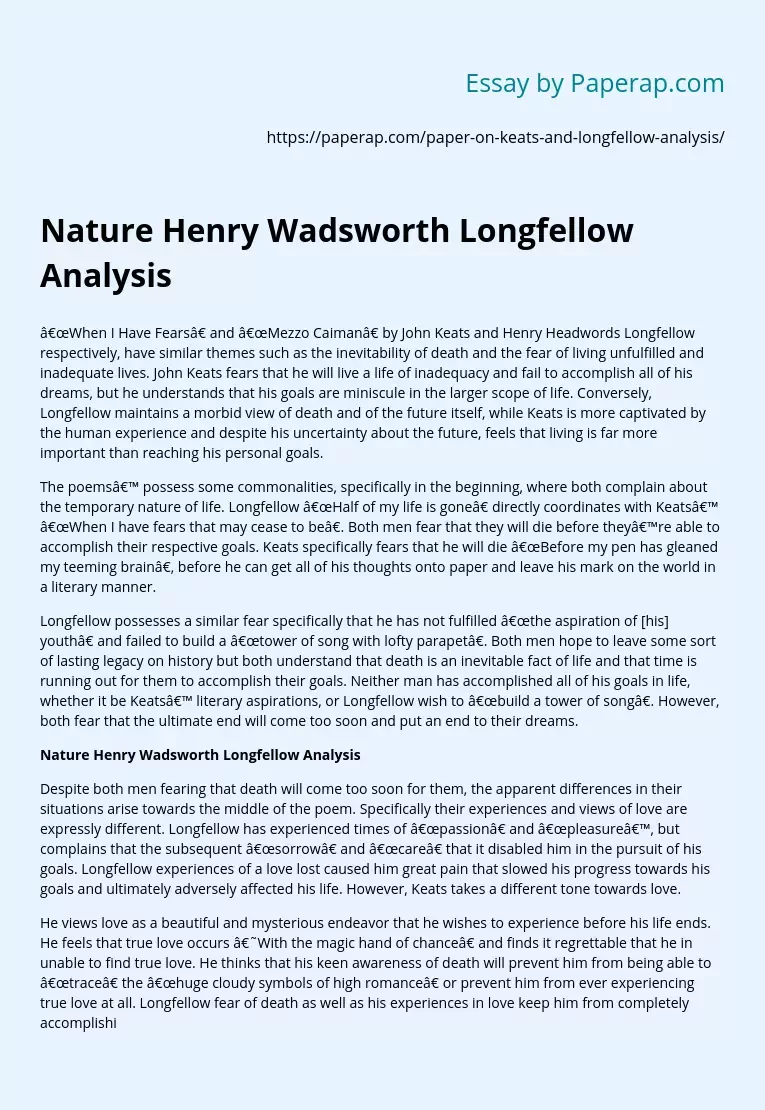Nature Henry Wadsworth Longfellow Analysis
“When I Have Fears” and “Mezzo Caiman” by John Keats and Henry Headwords Longfellow respectively, have similar themes such as the inevitability of death and the fear of living unfulfilled and inadequate lives. John Keats fears that he will live a life of inadequacy and fail to accomplish all of his dreams, but he understands that his goals are miniscule in the larger scope of life. Conversely, Longfellow maintains a morbid view of death and of the future itself, while Keats is more captivated by the human experience and despite his uncertainty about the future, feels that living is far more important than reaching his personal goals.
The poems’ possess some commonalities, specifically in the beginning, where both complain about the temporary nature of life. Longfellow “Half of my life is gone” directly coordinates with Keats’ “When I have fears that may cease to be”. Both men fear that they will die before they’re able to accomplish their respective goals.
Keats specifically fears that he will die “Before my pen has gleaned my teeming brain”, before he can get all of his thoughts onto paper and leave his mark on the world in a literary manner.
Longfellow possesses a similar fear specifically that he has not fulfilled “the aspiration of [his] youth” and failed to build a “tower of song with lofty parapet”. Both men hope to leave some sort of lasting legacy on history but both understand that death is an inevitable fact of life and that time is running out for them to accomplish their goals.
Neither man has accomplished all of his goals in life, whether it be Keats’ literary aspirations, or Longfellow wish to “build a tower of song”. However, both fear that the ultimate end will come too soon and put an end to their dreams.
Nature Henry Wadsworth Longfellow Analysis
Despite both men fearing that death will come too soon for them, the apparent differences in their situations arise towards the middle of the poem. Specifically their experiences and views of love are expressly different. Longfellow has experienced times of “passion” and “pleasure’, but complains that the subsequent “sorrow” and “care” that it disabled him in the pursuit of his goals. Longfellow experiences of a love lost caused him great pain that slowed his progress towards his goals and ultimately adversely affected his life. However, Keats takes a different tone towards love.
He views love as a beautiful and mysterious endeavor that he wishes to experience before his life ends. He feels that true love occurs ‘With the magic hand of chance” and finds it regrettable that he in unable to find true love. He thinks that his keen awareness of death will prevent him from being able to “trace” the “huge cloudy symbols of high romance” or prevent him from ever experiencing true love at all. Longfellow fear of death as well as his experiences in love keep him from completely accomplishing his goals, while Keats has lived an interesting and fulfilling life that he does not want to end, hence his fear of death.
The end of the poems both show the conflicting attitudes towards life and death by using situations where the men can reflect on their lives and life in general. Both men walk to the edge of a geographical feature, Keats a shore, and Longfellow a hill overlooking a city. Keats looks forward to the future during his time resting on the shore and realizes that life is a grand endeavor, and a “wide world” exists outside the confines of his life. He realizes that his oils are unimportant on this grand scale and seems to find peace in this fact.
Longfellow on the other hand, sees nothing but a vast city that symbolizes his past, and a “cataract of Death thundering from the heights”. Longfellow cannot move on from his past and henceforth cannot see any future for him at all, and will never achieve his aspirations. Keats on the other hand, realizes that he still has opportunity in his life and finds peace in the fact that he is still alive to achieve his goals, despite the realization that they’re not as significant as he once thought.
Nature Henry Wadsworth Longfellow Analysis. (2019, Dec 05). Retrieved from https://paperap.com/paper-on-keats-and-longfellow-analysis/

